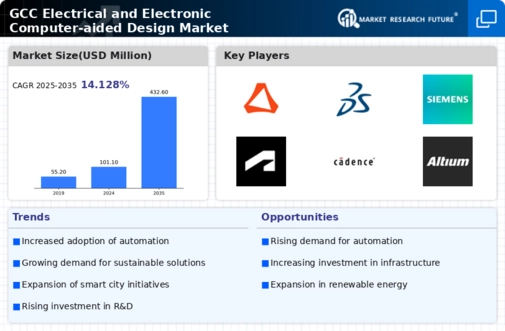Expansion of the Construction Sector
The GCC Electrical Electronic Computer Aided Design Market is significantly influenced by the expansion of the construction sector. With major infrastructure projects underway, such as the NEOM city in Saudi Arabia and various developments in the UAE, there is an increasing need for advanced CAD solutions to streamline design processes. The construction sector in the GCC is projected to grow at a CAGR of 6.2% from 2023 to 2028, which directly correlates with the demand for efficient design tools. This growth presents a lucrative opportunity for CAD software providers to enhance their offerings and cater to the specific needs of large-scale construction projects.
Increased Adoption of Renewable Energy
The GCC Electrical Electronic Computer Aided Design Market is witnessing a notable shift towards renewable energy projects. Countries like Saudi Arabia and the UAE are prioritizing solar and wind energy initiatives, necessitating advanced design software for efficient project execution. The Saudi Vision 2030 plan emphasizes the diversification of energy sources, which is likely to boost the demand for CAD tools tailored for renewable energy applications. As the region aims to generate 58.7 GW of renewable energy by 2030, the CAD market is expected to expand significantly, providing opportunities for software developers to innovate and meet the specific needs of this sector.
Growing Demand for Smart Infrastructure
The GCC Electrical Electronic Computer Aided Design Market is experiencing a surge in demand for smart infrastructure solutions. Governments in the region are investing heavily in smart city initiatives, which require advanced design tools for efficient planning and execution. For instance, the UAE's Vision 2021 aims to enhance the quality of life through smart technologies, thereby driving the need for sophisticated CAD tools. The market is projected to grow at a CAGR of 8.5% from 2023 to 2028, reflecting the increasing integration of technology in urban development. This trend indicates a robust opportunity for CAD providers to cater to the evolving needs of urban planners and architects in the GCC.
Regulatory Support for Digital Transformation
The GCC Electrical Electronic Computer Aided Design Market benefits from strong regulatory support aimed at digital transformation. Governments are implementing policies that encourage the adoption of digital technologies across various sectors, including construction and engineering. For example, the Qatar National Vision 2030 emphasizes the importance of technology in enhancing productivity and efficiency. This regulatory environment fosters a favorable landscape for CAD software providers, as businesses seek to comply with new standards and improve their operational capabilities. The market is likely to see an influx of investments in CAD solutions, driven by the need for compliance and modernization.
Rising Focus on Education and Skill Development
The GCC Electrical Electronic Computer Aided Design Market is bolstered by a rising focus on education and skill development in engineering and design fields. Educational institutions in the region are increasingly incorporating CAD training into their curricula, preparing a skilled workforce adept in modern design technologies. Initiatives such as the Saudi Technical and Vocational Training Corporation aim to enhance technical skills among youth, which is likely to create a larger pool of CAD professionals. This trend not only supports the growth of the CAD market but also ensures that the industry is equipped with qualified personnel to meet the demands of evolving projects.



















